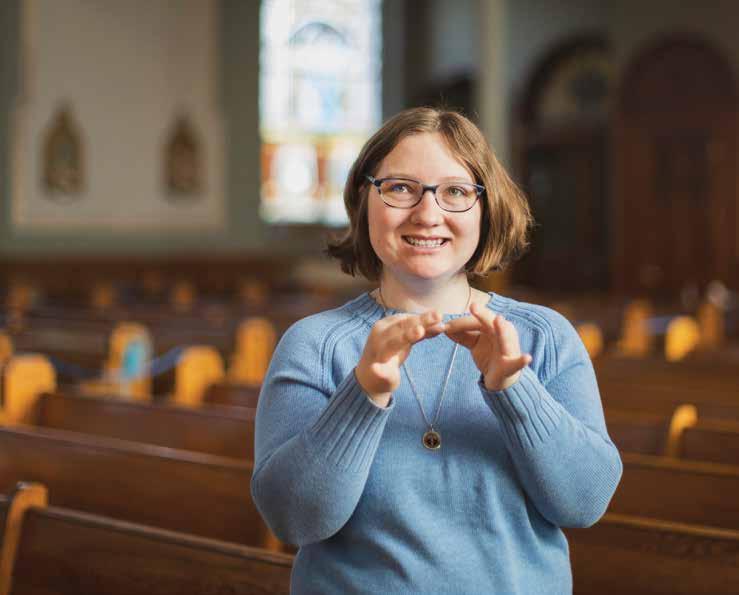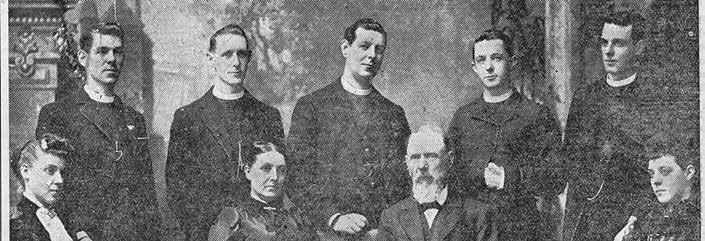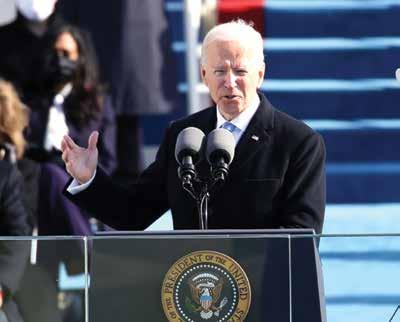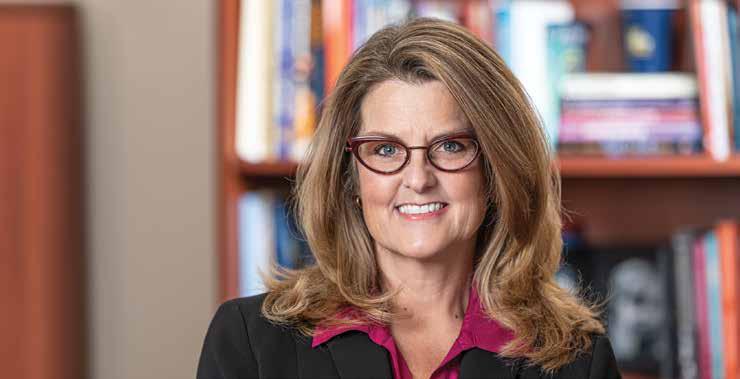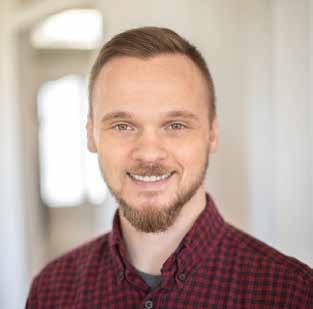
29 minute read
AT HOME FISH FRY
BY JESSICA RINAUDO
Lent looks a little different this year thanks to social distancing and health and safety protocols. And while some parishes will keep their fish fries going by means of carry out and drive-thru options, many churches are opting to skip this year’s Lenten tradition. But all hope is not lost! You can still have a fish fry in the comfort and safety of your home. And because I hail from the Deep South, my list of essential items for a Lenten fish fry may differ slightly from your own.
Advertisement
Here’s what you need for a good, down home, Southern fish fry.
1. Fried (cat)fish. Growing up, this meant venturing out onto the Red River or Lake Bisteneau and catching the whiskered critters first, then watching as my dad filleted, battered and fried them up on our back porch. While not realistic in the chilly flurries of southern Ohio, there are other, easier options.
If you’re going to buy the fish fillets and make the batter from scratch, look no further The Cajun Ninja. His recipe is easily located on YouTube.
Looking for an easier alternative? Buy pre-battered fish in the freezer section of your local grocery store. You can drop them in the fryer, or if you’re looking for a healthier option, place them in your air fryer.
2. Slaw! We call this “the good stuff.” In The Catholic Telegraph’s Ultimate Guide to Lent, you can download my recipe for free!
3. Hushpuppies. No fish fry is complete without these tasty crunchy-on-the-outside, soft-on-the-inside goodies. While you can buy these pre-made in the freezer section (which we did when we had a lot of fish, and not enough time for other things), they are wonderful when they’re made from scratch. 4. Fries. As a kid, my dad would make our French fries. He’d wash and chop the potatoes, then roll them around in the same batter he’d already made for the fried fish, before dropping in the fryer.
While I highly recommend this approach, these days we keep it simple. Our favorites frozen fries are Trader Joe’s brand, but any frozen bag will do. Dump them into the fryer, air fry them, or bake them in your oven.
5. Fried squash. One of my favorite parts of the fish fry growing up was watching my dad harvest the squash he grew in his garden, slice it up thinly, dip it in milk and then roll it in batter before tossing it in the fryer. Crunchy deliciousness.
6. Tartar sauce vs. ketchup: which do you go for? We’re a house divided, but if you’re the tartar sauce type, Love & Lemon’s recipe is sure to please.
Remember that fish fries usually provide a big financial boost for our Catholic parishes. While you bless your food, remember to pray for your pastor and parish family, and consider making a donation to your church in lieu of purchasing a fish-fry plate in person this year.
For all of the recipes to complete your at home fish fry, look no further than The Catholic Telegraph’s Ultimate Guide to Lent! The 2021 edition is a free, beautiful, helpful and easy-to-access resource to help you enter into the season of Lent in a whole new way. The guide will meet you wherever you are in their faith journey, with articles ranging from meat-free recipes to how to embrace the power of silence in prayer life.
Visit thecatholictelegraph.com/lent-guide to get your free copy.
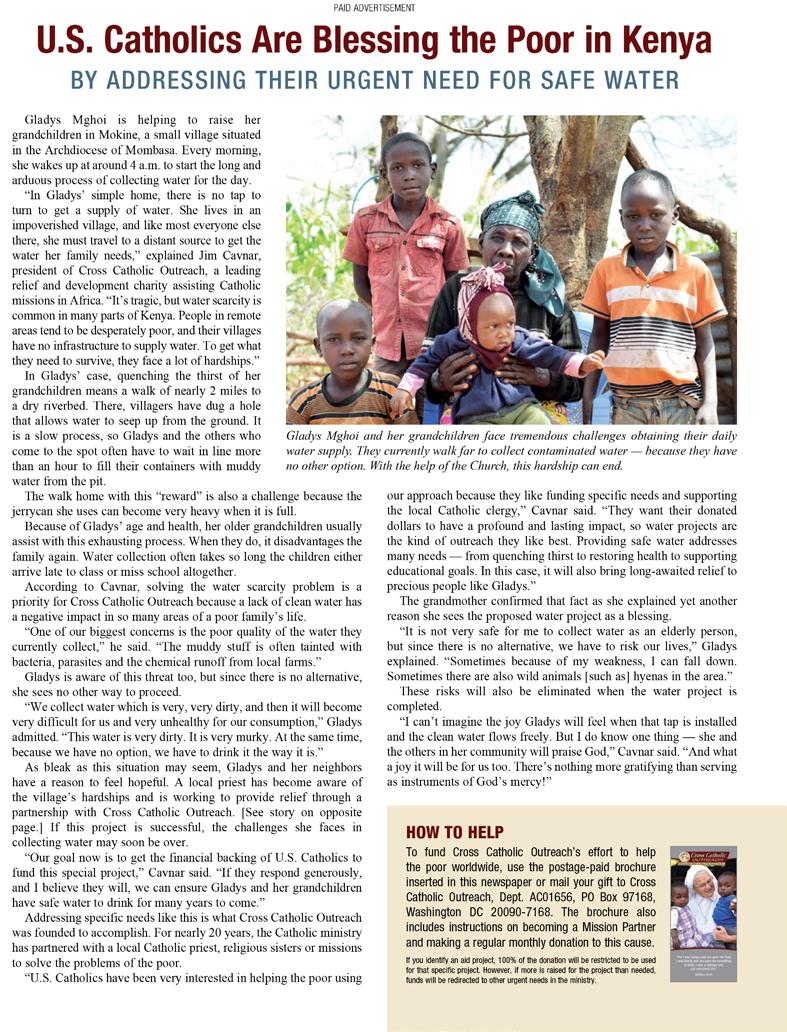
The Year of St. Joseph
BY BONNY VAN
In March 2020, the world as we knew it came to a stop with little time to prepare. However, through faith, initial fear turned into action and acceptance of how we must change going forward. Such fear and anxiety surely gripped St. Joseph when God called him to take Mary as his wife and the world as he knew it came to a stop. Through his strong faith, St. Joseph overcame his fear and accepted what was to be, taking on the role to protect his young family from the dark times ahead.
And, so it is fitting Pope Francis has called upon St. Joseph to be our role model, guide, counselor and intercessor during our own dark times. The pope declared the Year of St. Joseph from Dec. 8, 2020 through Dec. 8, 2021.
“In his Apostolic Letter Patris corde, the Holy Father explains that this proclamation was motivated by two reasons,” said Archbishop Dennis M. Schnurr. “First of all, it is a celebration of the 150th anniversary of the proclamation of St. Joseph as the Patron of the Universal Church by Blessed Pope Pius IX in 1870. Secondly, Pope Francis hopes that St. Joseph may serve as an inspiration and guide to all of us as we undergo the crisis of the ongoing pandemic. He writes, ‘Each of us can discover in Joseph – the man who goes unnoticed, a daily, discreet and hidden presence – an intercessor, a support and a guide in times of trouble. St. Joseph reminds us that those who appear hidden or in the shadows can play an incomparable role in the history of salvation.’
“Indeed, St. Joseph offers us an excellent example as we make our way through these difficult days that have been filled with unrest and uncertainty and fear. Again and again, God called Joseph to follow a path that was unclear, to journey to places that were unknown, and to make sacrifices that defied human calculation and worldly wisdom. As we look to St. Joseph’s holy example with a renewed focus this year, let us also entrust ourselves to his paternal love by asking him to walk with us, protect us, and bring us safely home to the Father’s House.” Along with the pope’s Apostolic Letter, the Apostolic Penitentiary has issued a decree for special indulgences throughout the Year of St. Joseph.
“For the Year of St. Joseph, there are 15 good works that will grant one an indulgence,” said Nicholas Hardesty, associate director of Adult Evangelization and RCIA. “These include praying for St. Joseph’s intercession for the unemployed; celebrating the Feast of St. Joseph the Worker on May 1; praying the Litany of St. Joseph for persecuted Christians; meditating on the Lord’s Prayer for at least 30 minutes or praying the Rosary with one’s family.”
Also, according to vaticannews.va, “the Apostolic Penitentiary grants a plenary indulgence to the faithful who will recite any legitimately approved prayer or act of piety in honor of St. Joseph, for example, ‘To you, O blessed Joseph’” especially on Mar. 19, his feast day, and on May 1, the Feast of the Holy Family of Jesus, Mary and Joseph.
For more information on plenary indulgences, prayers and devotions to St. Joseph, visit www.yearofstjoseph.org from the Diocese of Charlotte, or go to the website of the Oblates of St. Joseph, www.osjusa.org, and look in the top menu under “St. Joseph.”
“Each of us can discover in Joseph – the man who goes unnoticed, a daily, discreet and hidden presence – an intercessor, a support and a guide in times of trouble. Joseph reminds us that those who appear hidden or in the shadows can play an incomparable role in the history of salvation. A word of recognition and of gratitude is due to them all.” – Patris corde.

Letters About Dad
We asked Catholic Telegraph readers to share stories about their fathers. Over the next several pages, you can read some of their beautiful and moving submissions.
FROM JEAN BUELTERMAN (CATHEDRAL BASILICA OF ST. PETER IN CHAINS) My dad was kind, generous and loving and never had a nasty word to say about another person. He was a man of great faith. He loved our Blessed Mother. He could fix anything. We used to say give him a Bobby pin and he could fix your car. He was a simple man, but made everything seem like it was golden. He built our home, by hand, from the ground up. He worked for the railroad. In the early days he would travel from Cincinnati to St Louis weekly, but found time to plant a garden and grow beautiful flowers for us to enjoy. He loved us girls, and took care of mom and us with loving hands. He taught my sisters and me everything from driving a car to climbing ladders, and hammering nails and saying the Rosary. I remember him teaching me how to whistle! He had a great bass singing voice and would stand in the kitchen eating Oreo cookies and sing “Old Man River.” It was his job, working for the railroad in Indiana, that took him away from us way too young. He wanted to spend time with us at home, so he would commute to work. I remember that December morning when we heard about the accident. I’m sure he had his flaws but I can’t remember what they were. We will always love our dad.
FROM GERI SCHICK (VISITATION PARISH) My father, Jerome Rosenberger, was a workaholic. He worked a full time job, had his own electric business on the side and worked a third job to provide for his family. He would go to work every day, no matter how he felt. If someone in the community called and needed an electrician, he would go to help. He made sure his family always went to church, even on vacations we had to make it to Sunday church to pray for a safe trip. He was always there to give his advice and help if you needed it. He loved his family and his Catholic faith. Christmas was his favorite season and he went to confession frequently. He taught us how important it was to help others in need. He was always on time – he did not like to be late. My dad didn’t get to enjoy much retirement, passing away suddenly at 67, but he enjoyed traveling and taking his family on vacations.
PATRIS CORDE: DEVELOPING A FATHER’S HEART WITH ST. JOSEPH
On Dec. 8, 2020, Pope Francis promulgated his Apostolic Letter, Patris Corde (“With a Father’s Heart”), to commemorate the 150th anniversary of the declaration of St. Joseph as Patron of the Universal Church and to proclaim a Year of St. Joseph. Patris Corde is a meditation on the life of St. Joseph, commemorating him as a beloved, tender, obedient, courageous and faithful foster father to Our Lord and, as such, an example to all fathers.
But as St. Joseph is patron of the entire Church, he is a source of spiritual comfort and strength not just to fathers, but also to their children, which includes all of us. This is an especially acute point for me for two very personal reasons: First, I did not know my own father, who was killed in an automobile accident three months before I was born. As such, I take special solace in the spiritual fatherhood of St. Joseph, a medal of whom hangs close to my own heart. And second, as a father, I am both deeply aware of my obligation to be a faithful witness to my nine children, and profoundly disappointed with those many times I’ve failed in that duty. Pope Francis speaks to this in Patris Corde.
ST. JOSEPH’S ROLE The Holy Father begins by emphasizing St. Joseph’s role in salvation history. As the spouse of St. Mary and father of Jesus, St. Joseph “placed himself . . . at the service of the entire plan of salvation” and “cooperated . . . in the great mystery of salvation.” Of course, as the foster father of the Savior, St. Joseph’s position is unique in this regard. He gave himself completely to God’s plan for redemption, submitting to the will of the Father for the good of humankind. As a father to my children, I cannot duplicate that profound submission. I can, however, participate in St. Joseph’s uniquely radical cooperation, as a witness to my children of the joy of the gospel. As the man closest to Jesus, St. Joseph is a constant reminder of my duty to draw my children closer to Our Lord. And he is my refuge when I fail.
As Pope Francis goes on to explain, St. Joseph is an example to all of us in his quiet, docile witness to God’s salvific plan. This is a reminder that almost no one is converted to the faith (or has his faith deepened) by argument or debate. Rather, people are persuaded by persistent witness to the truth and joy of the gospel. This is exemplified by St. Joseph, whose pattern “is not one that explains, but accepts,” says Patris Corde. Trusting God, St. Joseph is our example of keeping our eye on the goal, accepting our evangelistic roles, and “to accept life as it is, with all its contradictions, frustrations and disappointments.” By his persistent example of enduring the confusion of a mysterious future, St. Joseph teaches us to persevere with grace rather than to despair with resentment. “Only as a result of this acceptance, this reconciliation, can we begin to glimpse a broader history, a deeper meaning.”
A FATHER IN THE SHADOWS Patris Corde ends with a consideration of St. Joseph as “a father in the shadows,” which has at least a couple of meanings.
First, as a father in the background, St. Joseph’s love for Jesus, Mary and us is disinterested. As citizens of what some call a commercial republic, we Americans (including American Catholics) have a tendency to reduce every human interaction to a transaction, in which mutual rights are asserted or mutual obligations are enforced. We tend to expect something in return for everything we give. We think of every gesture as requiring a reciprocal gesture—a repayment. But Pope Francis offers St. Joseph as an antidote to this unfortunate tendency.
“St. Joseph found happiness not in mere self-sacrifice,” explains the Holy Father, “but in self-gift.” He gave of himself perfectly and completely, without any expectation of something in return. And as St. Pope John Paul II often said, one cannot give what one does not possess. The ability to give oneself wholly to another calls us to cultivate virtues of hospitality, generosity, self-control, temperance and humility.
Second, as a father in the shadows, St. Joseph is a model for fathers to set their children on the right course, but then to allow them to set sail on their own. It is a father’s responsibility to show his children how to live their own lives, not to live their lives for them. Of course, this is subject to the normal course of physical, emotional, and psychological development. But even these considerations should always have an eye toward the ability of our children to go forth on their own – trained to choose well, but free to fail.
As Pope Francis puts it, “Every child is the bearer of a unique mystery that can only be brought to light with the help of a father who respects that child’s freedom.” If he is successful, the father becomes most “useless” precisely when he sees the fruit of his guidance: a child whose life follows the proper course, with gratitude for her father’s tutelage. As such, our children may leave our homes, but they will never leave the hearts of their fathers.
DR. KENNETH CRAYCRAFT
is an attorney and the James J. Gardner Family Chair of Moral Theology at Mount St. Mary’s Seminary & School of Theology. He holds a Ph.D. in moral theology from Boston College, and a J.D. from Duke University School of Law.
Letters About Dad
FROM ANNE COYLE HORN (HOLY FAMILY PARISH) My father, Thomas Joseph Coyle, was born in 1921, the second of 11 children. He was a lifelong member of Holy Trinity/Holy Family Parish in Middletown. He was inducted as a private into the U.S. Army in 1942; 313 Battalion; 80th Artillery under General George Patton. He was promoted to sergeant in 1943. His unit received battle honors for fighting in the Battle of the Bulge. In addition, his unit liberated a concentration camp. He was honorably discharged in 1945. He worked as a metallurgist at Aeronca for 24 years and retired from Armco Steel in 1986. After retiring, he and my mother volunteered at Middletown Regional Hospital, delivering Meals on Wheels. My father worked hard to provide my sister, brother and me with a solid Catholic education. He was a member of the parish council and volunteered at the Bishop Fenwick High School festival for many years. One of the things my father was most proud of was being a deacon. He was a graduate of the very first diaconate class of 1975. He served as a deacon at Holy Trinity/Holy Family parish for 30 years. The best lesson my father taught me was to be of service to others. He served his country, his community and, most importantly, God. This lesson has inspired me all of my life. My father entered eternal life in 2013. Three priests celebrated his funeral Mass and 11 fellow deacons were in attendance. I could hear God saying “Well done good and faithful servant!”
FROM MARJORIE TEPE WELDIE (ST. ALBERT THE GREAT PARISH) My father, Bernard Tepe, showed the meaning of marital love in such a special way. My mother suffered from dementia for a good portion of their final years together. My father was devoted to making sure she was taken care of by going every day to the nursing home to see that she was dressed with her hair combed. He went daily to feed her lunch and dinner, and absolutely nothing stopped him from fulfilling his mission to care for her. Dad felt that no one could care for mother the way he could and that, despite her dementia, she knew who he was when he went to see her. After nine years in a nursing home, my mother passed away. I think Dad felt his duty was fulfilled as he died just nine months after Mother. Today my husband and I have been married 55 years and I know my dad’s example of loving my mother greatly influenced us in our marriage. Thanks, Dad, for showing me the love of a husband, like St. Joseph, in giving totally of yourself to your wife.
A DAD’S PARTING WISDOM AND Spiritual Fatherhood

BY FATHER EARL FERNANDES
In his Apostolic Letter Patris Corde, Pope Francis describes St. Joseph as a beloved father; a tender and loving father; an obedient and accepting father; a working father who was creatively courageous; and, finally, as the “shadow of the Father,” reflecting the Eternal Fatherhood of God.
Priests are also called “Father.” Most of what I know about fatherhood, I learned from my own father. He spent long hours as a doctor at the hospital to put food on the table, and he spent his free time teaching us about the faith.
My father had a profound respect for human life and cherished us, and later, his grandchildren, always encouraging us to do our best. He also prayed, not only at home during our family Rosary, but also at the hospital for his patients. He taught me to desire to be a father, and as a priest, to exercise spiritual fatherhood.
THE SACRIFICE OF CALVARY Shortly before his death in July 2019, I had my last substantive conversation with my father. I asked him, “Is there anything else you’d like to teach your grandchildren?” His answer led me to reflect more deeply on the vocation of a priest as a spiritual father. He said, “Yes. First, tell my grandchildren to pray every day, but prayer alone is not enough. They need the fruits of the sacrifice of Calvary. Tell them to go to Mass.”
As spiritual fathers, priests are called to lead the Family of God in prayer. Like other fathers, priests do work on behalf of others in the liturgy. Priests offer the sacrifice of Calvary at each Mass; they feed God’s family with the Bread of Life. God did not make them for mediocrity. They must strive for heaven, not purgatory. Greatness is measured in faithfulness to God.”
Pope Francis wants a synodal Church that walks together. The priest, as spiritual father, must lead the People of God on their pilgrimage to heaven. He cannot allow anyone of His children to lag too far behind or to settle for less.
As a spiritual father, the priest must offer encouragement to the flock to bring out the best in them. He animates their vocation, their gifts and talents. How many priests unfortunately go through the motions in the celebration of Mass, in their preaching, and in their study? Everything can become routine and functional, but true fathers, with love for their children, never allow this to happen. True love for the flock opens them to hope which lies in the potential of their children.
PROTECT LIFE My father added, “Third, remind them to protect, defend, cherish and nurture human life.” This was not surprising to me as my father spent his life saving lives. He defended the unborn, the disabled and the elderly. He accompanied the sick back to health and comforted the dying and their families. To be a father, it is not enough to have children and generate life, one must nurture and educate that life. Certainly, Pope Francis calls the whole Church, but especially priests, to resist the throwaway culture which values people for what they do and have rather than for who they are. The priest accompanies God’s people.
Priests must lead the defense of life. It is not enough to baptize children; rather, the gift of faith must be nurtured through catechesis and formation and by offering support
STRIVE FOR HEAVEN “Second,” my dad said, “tell them to strive for greatness.
and encouragement to parents. As a spiritual father, the priest realizes that he is at the service of life.
BE WHO YOU ARE Never short for words, my father continued, “Tell my grandchildren to be humble. There will always be someone faster, stronger, smarter or more handsome, but recall what St. Francis de Sales said, ‘Be who you are and be that well in honor of the Master Craftsman whose handiwork you are.’”
As spiritual father, configured to Christ, the priest must follow the example of Jesus who humbled Himself to become man, born in utter poverty in a stable; who associated Himself with the poor and lowly; who washed the feet of His disciples; and, who humbled Himself, becoming obedient unto death.
BUILD OTHERS UP He concluded by saying, “Finally, tell them never to humiliate another person.” He recounted a story which he had never previously told me of how he was sent by his mother with special biscuits to a wealthy relative’s home on Christmas. Being poor, they did not have much to offer, but my grandmother wanted to give something. When my father knocked at the door, the woman took the biscuits and threw them on the floor for the dogs to eat. My father said, “She did that to humiliate us because we were poor. Never let my grandchildren humiliate another person.”
As spiritual fathers, priests are called to be like St. Barnabas, a “son of encouragement,” building people up, especially the poor. The priest must be equally accessible to the poor and rich alike. St. Luke’s Gospel demonstrates the preferential option Jesus had for the poor. The bottom line: Treat others with respect. Every father must acknowledge the dignity of his child.
I learned a lot about fatherhood from my own father. During this Year of St. Joseph, I am learning from St. Joseph about priesthood and fatherhood. The Holy Father writes: “In every exercise of our fatherhood, we should always keep in mind that it has nothing to do with possession, but is rather a sign pointing to a greater fatherhood. In a way, we are all like Joseph: a shadow of the heavenly Father, who ‘makes his sun rise on the evil and on the good, and sends rain on the just and the unjust’ (Mt 5:45). And a shadow that follows his Son.” (PC, 7)
I ask you to pray for your priests – that we may be holy like St. Joseph and reflect the tenderness of the one God and Father of us all.

Letters About Dad
MATTHEW RUTTLE (ST. RITA PARISH) Our father, Patrick Joseph Ruttle, was a man of humor, deep faith, compassion and love. He, and our Mother, Yvonne, truly “enfleshed” what it means to be a disciple of the Lord. My father always made room in his life and heart for my mother, our family and those suffering in our community. He always worked to bring out the good in others through jokes, singing, fun parties and in good dialogue. He was – and still is from heaven – a sure guide on what it is to be a man of family, faith, work and enduring love. I miss him – and my late mother too. Pray for us! Watch over us!
FROM BERNARD RIESKAMP (OUR LADY OF VISITATION PARISH) Mom and Dad raised a family of six boys during the 1950’s. My two sisters were born in the 60’s, making us a grand total of eight. Raising a large family was a loving challenge my parents carried out with discipline, respect and affection. Dad was a Cincinnati policeman and worked a second job as a groundskeeper for a large estate. He worked many hard, long hours, but always, somehow, made time for his family. Car trips and rides to one of the many local parks were our family’s most anticipated and best-loved form of entertainment. Once a week or so, dad would load up the kids in the family station wagon and take us on rides in the countryside or to a park. Slowly driving down our street, the neighborhood kids shouted out to us as we passed by: “Where are you guys going?” With a big smile on his face, dad shouted back: “To the moon, we’re going to the moon!” The family members laughingly parroted dad’s statement: “We’re going to the moon.” About 20 minutes later we passed by The Moon Tavern. What fun simple times we had. I’ll always remember one of dad’s favorite lectures: “It’s the simple things in life that are important. You can have all the money and possessions in the world but if you lose your soul, you have nothing. Always remember to honor God, family and country, and in that order!” It still rings in my ears to this day. Dad taught me the importance of hard work. “You’ll better appreciate the things you work hard for and earn. But remember, they’re only things. The intangibles are important; love & friendship! The older you get, the more you’ll understand.” “Respect all people and all living things.”
Percy Stricklin
Church of the Resurrection Parishioner and Father Serves as Family and Community Role Model
BY EILEEN CONNELLY, OSU

Keeping God first. For Percy Stricklin, that’s the key to living his vocation as a loving husband, father and committed Catholic, and it’s a choice he affirms daily.
“Every morning when I wake up, I immediately focus on God,” he explained. “It sets the tone for the day. Even though there may be some adversity, you get through that by keeping Christ at the center.
Stricklin, a convert to Catholicism and active member of Church of the Resurrection in Bond Hill, appreciates the opportunity the Year of St. Joseph offers to honor and reflect on the carpenter’s deep faith and example.
“He kept God first, and that takes humility, discipline and courage in the face of ridicule and danger. Joseph teaches us that there will be times when we have to allow something to happen that isn’t the ideal of what we perceive it should be, but also realize that it could be the biggest blessing. It takes faith and the belief that God will be true.”
Born and raised in Mississippi in the Southern Baptist tradition, Stricklin was exposed to Catholicism at various points over the years, but became better acquainted with it when he met his future wife, Lucy, in college. Both were students at the University of Southern Mississippi in Hattiesburg. Lucy was a Catholic exchange student from the State of Yucatan, Mexico, and Percy, an unofficial English tutor.
“We met through friends,” he recalled. “All it took was one look at her smile.”
The Stricklins have been married for 21 years and have two daughters, Lileth, 20, and Annette, 17. When the young family relocated to Cincinnati from Memphis in 2004 for Stricklin’s work with Kroger, their search for a Catholic parish led them to the then St. Agnes (now Church of the Resurrection). They were immediately welcomed into the diverse urban faith community by Deacon Royce Winters and his wife, Nor-Rita, Inspired and encouraged by his family and their St. Agnes friends, Stricklin entered RCIA and was received into the Catholic Church in 2006.
Now he feels that every day is the chance to walk “hand in hand with Jesus” and strive to be an example of faith and love for his family.
“I spend a lot of time praying about my role as a father,” he said, “especially because I was raised by a single mother and didn’t have any father figures. It wasn’t until later that I came to know my father. I promised myself early on to be there for my family no matter what.”
“I can be a provider for my family, but I also want to set the example,” Stricklin added. “It’s sometimes tough, so you
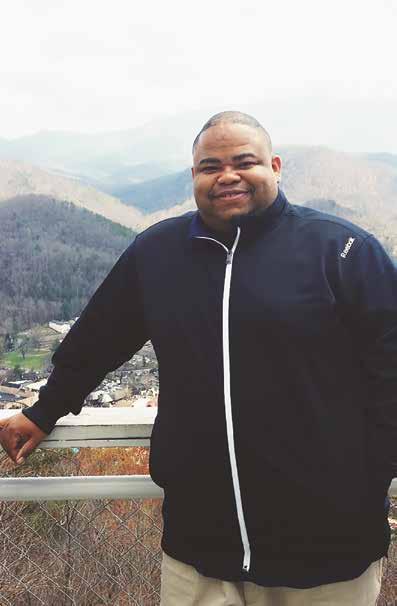
need to have a center, you need to have faith. I tell my girls to that they have to be open to focusing on God, to listening to Him.”
He’s hopeful that his involvement at Church of the Resurrection is a means of modeling their faith for his daughters. Sticklin is currently chairperson of the Pastoral Council, serves as a sacristan, and has been active on various parish committees.
“When they come to me to have a conversation about our faith, or get involved without me asking, it gives me great joy,” he said. “When I see them volunteering, how they pray for and encourage other people, I know they’ve been listening. They are both blossoming in their faith.”
That faith has also been the unifying factor in his bicultural marriage to Lucy. “Yes, we are from different cultures, but our mindset has always been to focus on Christ, along with an openness to understanding and respecting each other,” Stricklin said. “The universal Church unites us all, and the same thing has happened at home for us. We’re in sync with each other because we keep our eyes on the same thing: God. It’s been a journey, and it’s something we work at every day, but we’re stronger because of any struggles we’ve faced.”
“My wife is a very patient, quiet woman, and that’s been good for me,” he added. “She’s allowed this country boy to mature. We talk about our faith more than ever now, and grow together spiritually as one through our prayer.”
Regarding his role at the parish, Stricklin said he and his family are committed to ensuring that “all are welcome,” just as they were years ago.
“Welcoming is one of our pillars at Church of the Resurrection, followed by growing, evangelizing and stewardship. Being welcoming is the key to opening the door to hearing God’s message, to experiencing His call. This plants the seed. Community has to be that way. It’s what people are looking for and how they can experience God.”
Letters About Dad
JARROD LUX (ST. PETER IN CHAINS) I have been blessed to have excellent fathers in my life, all of whom resemble St. Joseph: my grandfathers, Bill and John, and my father-in-law, Conrad. I write to you today about my own father, Jerry Lux. Our parents are the first images of God for us, and if God chose St. Joseph to be His human father, He had to have seen much of Himself in St. Joseph. Our Savior learned the value of hard work, dedication, and perseverance from him, and the “passion” with which St. Joseph lived his life must also have been a reflection of the “Passion” of Jesus. Dad, likewise, used his passion of baseball to teach me important life lessons. Be courageous: When I stepped out of the batter’s box in fear, he put a bat behind my feet to ensure I stood my ground and faced that fear. When I felt ashamed for having to relearn how to hit by using a tee, he told me that even major leaguers have to relearn fundamentals sometimes to break through a slump. When I would lollygag on the field, his enthusiasm compelled me to hustle. When I would lose faith in my ability to play, he never gave up on me, and he never let me give up on myself. Years later, I can still see and hear Dad rooting and encouraging me from first base, his words instilling me with confidence. His insight and wisdom now help me hit line drives, despite the curve balls life pitches to me. If they play baseball in Heaven, I’m sure St. Joseph will recruit my father when he arrives. Thank you for giving me the opportunity to share my thoughts on St. Joseph and my awesome dad, Jerry.
FROM LINDA (ST. HENRY PARISH) I am the oldest of five children in our family. My father owned a drug store and worked on Sunday. When I turned 13, I went to work with him on Sunday morning, so regular Sunday Mass was hard to attend. He would take me to midnight Mass in the city at one of the large churches downtown. It was a special time we shared together.
FROM MORGAN KRICHBAUM (ST. BERNARD PARISH) My father, John, is an outstanding example of a loving, patient, selfless, contemplative, and wise man. Everyone who encounters him benefits from his characteristic reflection of Christ. As I prepare for new life adventures – including marriage and geographical relocation – I am honored and challenged to reflect the light and love of our God that dad has exemplified throughout my life.

